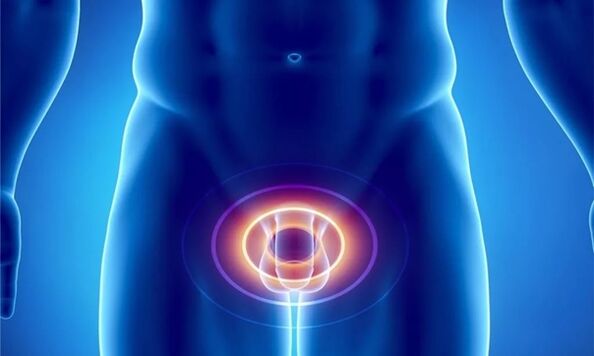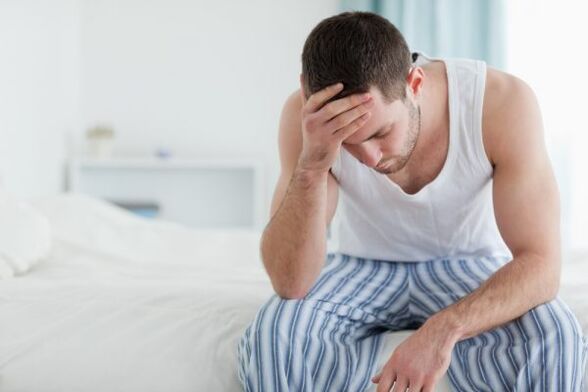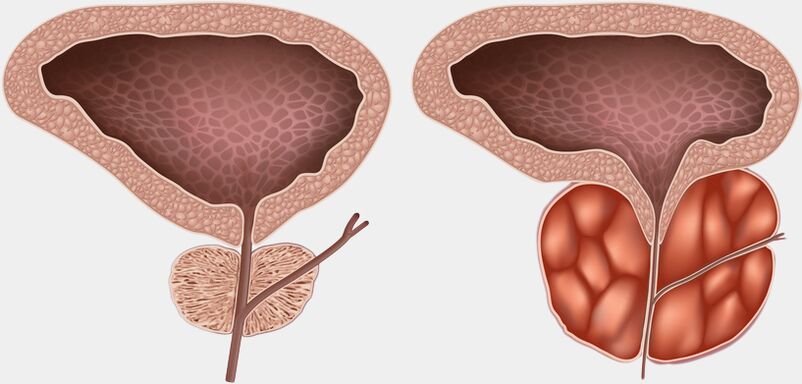
The prostate plays an important role in the functioning of the male body - it normalizes the presence of sperm, dilutes sperm and participates in the regulation of hormonal levels.
Today, prostatitis is very common in men, according to statistics - 30% of men aged 30-55 suffer from this pathology, which is an inflammatory phenomenon in the prostate gland.
Forms of prostatitis
Experts distinguish several types of pathology:
- Chronic bacterial - a chronic pathological type that causes bacterial infection;
- Chronic abacterial - a chronic inflammatory process caused by non-infectious causes;
- Acute form of pathology - chronic pain attacks concentrated in the genital area;
- It is difficult to determine the asymptomatic form of the pathology, usually only after prophylactic examinations.
Signs of prostate development
How does prostatitis manifest itself? In general, doctors identify 6 signs of prostatitis. If a man sees at least 2 symptoms from this list, he must see a doctor:
- A weak urine flow in a short range;
- Difficulty urinating;
- Painful events during urination;
- Duration of urination, urination, interstitial flow;
- Partial emptying of the bladder;
- The desire to urinate often, especially at night.
The doctor will always be able to detect the first signs of prostatitis in men, and after the diagnosis will be carried out in a timely manner and give a positive result.
Causes of pathology
Experts talk about the following causes of the disease:
- Weakened immunity - reduced protective barriers that prevent the occurrence of many viral infections;
- Infectious processes - viral elements, microbes, bacteria enter the prostate through the blood or lymph. A symptom of this phenomenon is a rise in temperature with prostatitis;
- Sedentary lifestyle - leads to disruption of blood supply, lack of oxygen;
- Blood circulation is disrupted due to stagnant moments in the genital area - it is caused by a disordered sex life, prolonged abstinence from sex, irregular sex.
Inflammation of the prostate can begin due to the penetration of microbes, but the development of the infection requires the following factors - the presence of harmful addictions, constipation, hormonal disorders, pathogenic microflora that can occur as a result of trauma. hypothermia, etc.
Symptoms of pathology
How does prostatitis manifest itself? Important symptoms that indicate the onset of prostatitis are a difficult urination process, painful sensations. Frequent calls to empty the bladder in small parts indicate the development of pathology. Therefore, in this case, you must consult a doctor, otherwise the inflammation will become chronic.
The initial stages of the pathology may be asymptomatic. It is easier to identify acute forms of the disease - the manifestation of the pathology is always sudden, acute. It should be taken into account that the course of the disease depends on the individual characteristics of each person's body.
The following symptoms of prostatitis are different:
- Painful sensations in the perineal region;
- Increase in temperature;
- Bowel movements are accompanied by painful attacks;
- Potential disorders;
- Frequent urination
- Increased sweating;
- General disorder;
- Feeling of fullness in the bladder;
- Irritability, sudden mood swings;
- Urethral secretions during bowel movements.
Usually only a few of the above points are visible.
Temperature rise
The development of an acute pathological form is characterized by intoxication of the body, a febrile condition, and with prostatitis, the temperature can reach 40 degrees. Syndromes of this pathology - urinary disorders. Acute prostatitis requires timely treatment, otherwise it can lead to negative consequences before surgery.
A protracted decision to undergo a medical examination can affect the transition to a chronic form of pathology that develops over a long period of time and requires large financial costs for treatment.
Pain attacks with the development of pathology
The complex structure of prostatitis is accompanied by painful symptoms. In men, prostatitis pain is not characterized by precise localization. In the absence of a healing process, pain attacks increase and spread to other genitals. In advanced cases, the acute stage of the disease develops adenoma.
In men, prostatitis pain is known to be short-term or long-lasting.
Frequent painful attacks lead to a restless lifestyle, the development of neuroses in men and a deterioration in quality of life.
Painful feelings usually occur in the following moments:
- During urination;
- During an erection;
- During sexual intercourse;
- After sexual intercourse;
- During bowel movements;
- Due to prolonged abstinence or, conversely, perverted sexual intercourse;
- After hypothermia;
- Due to severe physical stress.
Low back pain begins when the pathology develops outside the prostate. Pain attacks are either dull or sharp. Painful feelings can last a long time due to indifference to pathology. Therefore, it is very important to consult a urologist in time, because inflammation can go to the kidneys.

In addition, pathologies in the prostate region are characterized by sharp or sharp painful attacks in the groin area, rarely in the legs.
It is possible to eliminate painful feelings in the following ways:
- Prostate massage;
- Phytotherapeutic treatment;
- Hormonal methods for the treatment of pathology;
- A special diet to normalize a person's condition;
- Antibacterial ways to eliminate harmful elements;
- Use of adrenergic blockers to eliminate urination.
Prostate adenoma or prostatitis?
Prostate adenoma is a benign neoplasm of the prostate gland, usually observed in men after the age of 45-50. Hormonal imbalance is recognized as an important cause of pathology - the level of male hormones changes and decreases over the years. There are also risk factors that lead to the development of pathology - obesity, stress, atherosclerosis, harmful addictions.
The manifestation of the pathology is clearly expressed, so it is possible to make an accurate diagnosis in the early stages of development.
In men, the course of prostate adenoma moves forward, develops, the tumor gives rise to new clinical moments.
Symptoms of prostate adenoma and prostatitis are similar in the stronger half of the population - difficulty urinating frequently, burning sensation in the prostate, pain.
The course of prostate adenoma in men depends on the stage of this pathology.
The consequences of prostate adenoma in men are severe - kidney failure, cystitis, urolithiasis.
Diagnostic measures
The doctor can diagnose the symptoms of prostatitis in men and will prescribe timely treatment. To diagnose prostatitis, you need to see a urologist who will examine you and prescribe other important diagnostic procedures:
- Medical examination to draw a general clinical picture;
- Conducting urine tests;
- Tests for STIs;
- To determine the presence or absence of infections, a swab is taken from the urethra;
- Discharge analysis;
- Genital ultrasound;
- Urography;
- Biopsy - if cancer is suspected.
Using the results of the above processes, the doctor develops a treatment regimen for the disease in a particular patient.
Methods of treatment of prostatitis
How to treat this pathology? After the diagnosis of the disease, the doctor determines the treatment regimen of the pathology, usually using a unified approach consisting of the following points:
- Antibacterial therapeutic methods - a specialist prescribes a course of medication, ie antibiotics to eliminate harmful trace elements that cause prostatitis. They also lower the temperature;
- Physiological effects, for example, through lasers, ultrasonic waves, electromagnetic waves.
- Traditional treatments are used - hot bath procedures with herbs;
- Massage is performed in the prostate gland - relieves stagnation of the ducts, increases blood supply to the genitals;
- Herbal medicine - the use of decoctions made from useful herbs, dietary supplements helps to strengthen the immune system, fights infection;
- Psychotherapeutic methods - a person develops negative psychological problems due to prostatitis, loses self-confidence, fears during intercourse;
- Surgical methods of treatment are used in advanced and severe stages of pathology, such as prostate abscess;
- Correction of the immune system - the doctor may prescribe certain vitamins, minerals, beneficial micronutrients to strengthen the patient's immunity;
- For prostatitis, a balanced, proper diet, abstinence from alcohol, smoking, fatty foods, limiting salt intake, as well as drinking more plain water - at least 2 liters a day.

Preventive measures
It is important to monitor your health. To prevent the development of prostatitis, it is necessary not to be exposed to the factors that can cause its formation:
- Do not overcool;
- Eat a balanced, healthy diet;
- Exercise, do sports;
- Have sex with a regular partner, protect yourself from STDs;
- Get an annual check-up by a urologist to determine the presence or absence of the disease in a timely manner.
























